Studies on David Collection (11 vols.)
Digital Logos Edition
Overview
The Studies on David Collection (11 vols.) discusses the relationship between King David and Saul and how their connection had an impact on the fate of Israel. Also covered is the correlation between Egypt, Palestine and Israel, as the contact between these places was not as large as once thought, and knowing this fact is important for anyone studying this period in history and has an impact to how it relates to us today.
By making use of the information in Studies on David you are able to enhance your understanding of the Iron Age that was a part of ancient Israel—especially the process of state formation as it relates to David. Also covered is the idea that during the time of David, Israel was in a time of social, political, and economical transition and that David played the role of mediator in each of the areas. Studies on David is an important addition to your library because of the topics surrounding David, his life and his interaction with King Saul are discussed and how they relate to us today.

- Each volume includes a list of abbreviations used
- Includes a list of references and authors cited
The work’s distinctive strength in content. . .proves highly rewarding in the end.
—Norman K. Gottwald, Professor Emeritus of Biblical Studies, New York Theological Seminary.
- Title: Studies on David Collection (11 vols.)
- Publisher: Sheffield Academic
- Volumes: 11
- Pages: 2,743
This title is included in the following collections
You can save when you purchase this product as part of a collection.
Logos 8 Messianic Jewish Diamo...
$2,999.99$2,999.99Logos 9 Messianic Jewish Diamo...
$2,999.99$2,999.992025 Messianic Jewish Portfoli...
$4,749.99$3,562.49Library of Hebrew Bible/Old Te...
$4,999.99$4,999.99
- $11,399.99
- $23,999.99$17,999.99
- $24,999.99
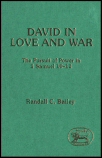
David in Love and War is a reworking of the dissertation that Bailey worked on while at Emory College in Atlanta, Georgia. His interests in literary critical concerns directed him in regards to the information he wanted to cover in his book. Bailey covers 2 Samuel 10 —12 as well as the connection between David and Bathsheba.
Randall C. Bailey is the Andrew W. Mellon Professor of Hebrew Bible at Interdenominational Theological Center in Atlanta, GA. Dr. Bailey is a native of Malden, M.A. He received the B.A. from Brandeis University, the M.A. in Social Service Administration from the University of Chicago, the M.Div. from Candler School of Theology and the Ph.D. in Old Testament from Emory University.
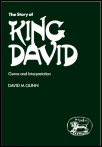
The Story of King David attempts to provided a fresh perspective on the narrative about David in 2 Samuel and 1 Kings. Commonly known as the "Succession narrative," Gunn attempts to create better appreciation for its nature as a story. The book provides an initial survey of pespectives on the narrative, followed by his own proposed alternative view of the succession narrative as a story. This proposal is the developed through literary and rhetorical analysis. Gunn concludes with his own interpretation of the narrative and two appendixes on literary criticism and style.
David M. Gunn is A. A. Bradford Professor of Religion at the Texas Christian University.
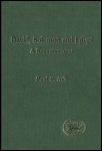
During the time of David and Solomon, the relationship between Egypt and Palestine was a pertinent one. Ash analyzes the evidence—epigraphical sources from Egypt, as well as the archaeological data from Palestine. He also examines the biblical text, which reveal that the inhabitants of ancient Palestine and the people of Egypt had minimal contact. When reading any content that relates to the history of the relations and contacts between Egypt, Palestine, and Israel this resource is of benefit, as it helps to shed light on the relationship between these countries.
Paul S. Ash received his Ph.D from Emory University, Atlanta.
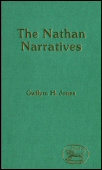
The three Nathan narratives in 2 Samuel and 1 Kings are given detailed consideration in this fascinating study. A persuasive attempt is made to reconstruct the original form of the traditions and to trace the modifications made to them before they were finally accepted into the Succession Narrative. The original Nathan, a court official and chief spokesman for the Jebusite group, sought a working compromise between the original Jebusite inhabitants of Jerusalem and its new Israelite settlers. After accepting service under King David, Nathan tried to secure the best he could for the Jebusites in this new situation. When this tradition was expanded, modified and theologized, the consistent Nathan of early tradition became a complex character, and almost appears as a dual personality: the diplomatic court prophet of the original narrative became an outspoken prophet of Yahweh in the “theological” accounts of his activities.
Gwilym H. Jones is Professor of Religious Studies in the University of Wales, Bangor.
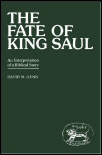
David M. Gunn wrote The Fate of King Saul to inspire a renewed interest in the study of the Old Testament as well as the study of Saul. He explores the study of Saul and researches the narrative aspect of the books of Samuel. Additionally, he also researches the narrative that is a part of the Old Testament since the content can be complicated and difficult to understand.
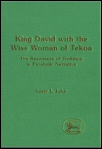
In his book King David with the Wise Woman of Tekoa, Lyke researches in depth the historical and social processes of 2 Samuel 14 that shaped the Hebrew Bible. Also covered are the many historical and social processes that formed the Hebrew Bible as a whole.
Larry L. Lyke is Assistant Professor of Hebrew Bible, The Divinity School, Yale University, New Haven, Connecticut.
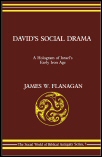
In the reface of David’s Social Drama, Flanagan writes that the goal of the book is to “enrich the understanding of ancient Israel's early Iron Age, especially the processes of state formation that the Bible attributes to David”. Also addressed in this book are the traditions of biblical history as well as archeological and literary information and how it pertains to David.
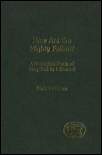
This book marries the several elements:
- A given text (1 Samuel)
- A focal character (King Saul)
- A spacious and creative theorist (Mikhail Bakhtin)
- A historical context
Barbara Green is Professor of Biblical Studies at the Dominican School of Philosophy and Theology, Berkeley.
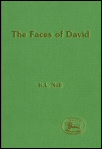
This synchronic study of the books of Samuel examines the multifaceted character of David. His is a complex tale, seemingly designed to explore the human dimension of a traditional motif: divine election and rejection. Through speeches and actions, David is revealed as a man who never quite understands his fate. Why has Saul been rejected and why is David not rejected? If Saul sinned, David sinned boldly. The man, David, through poetic soliloquies (2 Samuel 1: 19–27; 22:2–51; 23:1b–7), explores this question.
K. L. Noll is Assistant Professor of Religion at Kentucky Wesleyan College in Owensboro, Kentucky.
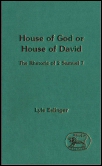
2 Samuel 7 has always been a focal point in discussion about the Davidic covenant and its relationship to the exodus (or Sinai) covenant. This new rhetorical study of the speeches of Yahweh and David in 2 Samuel 7 examines the dynamics of the conversation between the two characters, a conversation essentially about houses and obligation. The reading proposes that talk of a Davidic dynasty is a diversionary strategy that Yahweh uses to deflect David's interest from a temple building project. It also suggests that the manner in which Yahweh presents the offer of dynasty conceals an empty offer behind the facade of a grandiose and unending lineage. The history of religions problem of a Davidic versus sinaitic covenant may be resolved by attending less to the facade and more to the undertones of Yahweh's offer.
Lyle Eslinger received his Ph.D. from McMaster University. He is Professor of Western Religions at the University of Calgary.
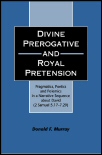
In this close reading of a text central to the story of David, the author, using the tools of linguistic pragmatics and poetics, exposes the text's promotion of a prophetic-based ideology, through a polemical rhetoric that polarizes David and Yahweh around the opposed notions of king (melek) and leader (nagid). He then goes on to analyze the context, in ancient Near Eastern royal ideology and in Samuel, for how the text develops this opposition, and finally reflects on its promulgation of the supreme mediacy of the prophetic word.
Donald F. Murray is Lecturer in the Department of Theology, University of Exeter.